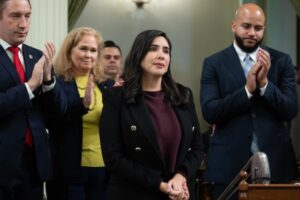On Thursday, July 24, 2014, the Opportunity Youth Incentive Fund (OYIF) announced its second round of grants, including a grant to the Alliance for Children’s Rights and 18 other communities. The Opportunity Youth Incentive Fund is managed by the Aspen Institute’s Forum for Community Solutions and is dedicated to reconnecting “Opportunity Youth” to education and employment. Opportunity Youth is a term used to describe the 6.7 million young people between the ages of 16 to 24 in the United States who are neither enrolled in school nor participating in the labor market.
All 19 OYIF community grantees received planning grants last year along with 2 communities that received multi-year awards. Collectively, these 21 community grantees will continue to focus their efforts on the successful reconnection of Opportunity Youth through community collaborations that remove barriers, connect the various systems that touch their lives, and begin to scale effective pathways to jobs and long-term, family-sustaining success. The Aspen Forum for Community Solutions plans to provide up to $13 million in grants to the 21 OYIF sites and learning partners over the five-year course of the Fund.
“Los Angeles foster youth are in crisis with only 40% graduating from high school and more than half ending up homeless, incarcerated or facing lifelong dependency on public assistance,” said Janis Spire, CEO of the Alliance for Children’s Rights. “Aspen’s investment will allow our L.A. community of partners to break down silos and coordinate systems and programs that bolster secondary, post-secondary and employment advancement for the most vulnerable young people in our community. Together with key partners including the L.A. Chamber of Commerce, Los Angeles City and County Workforce Investment Boards, Los Angeles Unified School District, the Los Angeles County Department of Children and Family Services, and a strong network of community-based organizations, colleges, employers and private foundations, we look forward to helping youth exit a cycle of poverty and enter a long overdue cycle of success.”
During the past year, all OYIF grantees have demonstrated early success by bringing together the K-12 systems; community colleges and other postsecondary providers; municipal and state governments; national and local philanthropy and nonprofits; and private sector leaders in their communities, to design education and employment reconnection strategies for young people who have extraordinary barriers to success.
“The results of the collective impact approach should encourage all sectors to evaluate their strategies beyond stand-alone efforts, as our experience has shown that working together with a common agenda, shared metrics, and strong coordination and communication across systems, can aggregate the impact of community actors,” said Melody C. Barnes, former director of the White House Domestic Policy Council and Chair of the Aspen Forum for Community Solutions.
From southern Maine to California OYIF grantee partners are deepening collaborative partnerships to maximize the impact of local systems and revenue streams to scale up real pathways to good paying jobs for the young people who most need them.
“One system alone cannot address the great challenges facing young people with some of the worst odds in life, such as youth who have been involved with the child welfare or juvenile justice systems,” said Patrick McCarthy, president and CEO of the Annie E. Casey Foundation. “The collective impact approach holds great promise, aligning multiple systems to better support these young people’s needs and interests and give them a real shot at succeeding in school and in life. We look forward to the evidence and lessons that will emerge from these community efforts in the coming years.”
Grantees also work with local employers to ensure opportunity youth receive the training necessary to gain employment. To support these efforts, JPMorgan Chase has partnered with the Aspen Forum for Community Solutions and others to encourage targeted training programs.
“Employers are looking for people with the right skill sets to help their businesses thrive in today’s economy,” said Dalila Wilson-Scott, President of the JPMorgan Chase Foundation. “The skills-based training strategy that JPMorgan Chase, AFCS and OYIF have developed is a playbook for connecting young people to employment opportunities, and it can be replicated by partners around the country.”
The Aspen Forum for Community Solutions will continue to engage with all OYIF grantees to gather data and facilitate the sharing of best practices, developing a roadmap of research, tools, and resources for other collective impact approaches.
“Every funder wants to invest in system changes that will have a meaningful impact on organizations, institutions, employers and families. The Aspen Forum for Community Solutions is a leader in the field, and the OYIF grantees are making tremendous progress through the collective impact model. We’re proud to continue our support for this effective approach and look forward to seeing even more results,” said Hilary Pennington, Vice President, Ford Foundation.
OYIF Community Grantee Partners:
The communities selected to partner with the Aspen Forum Opportunity Youth Incentive Fund for the second round of funding include:
Atlanta, GA | United Way of Greater Atlanta | Atlanta Opportunity Youth Collaborative
Austin, TX | Workforce Solutions Capital Area | Austin Opportunity Youth Collaborative
Baltimore, MD | Ingoma Foundation & Johns Hopkins Centers for Adolescent Health and the Prevention of Youth Violence | Baltimore City Opportunity Youth Collaborative
Boston, MA | Boston Private Industry Council & Boston Opportunity Agenda | Boston Opportunity Youth Collaborative
Chicago, IL | Mayor’s Office | Thrive Chicago
Del Norte County, CA | Wild Rivers Community Foundation | Del Norte County and the Adjacent Tribal Lands Opportunity Youth Initiative
Denver, CO I Rose Community Foundation | Denver Opportunity Youth Investment Initiative
Detroit, MI | Detroit Employment Solutions Corporation & Excellent Schools Detroit | Detroit Pathways to Opportunity Initiative
Greenville, MS | Rural LISC | GO YOUTH
Hartford, CT | Capital Workforce Partners | Hartford Opportunity Youth Collaborative
Hopi Reservation, AZ | The Hopi Foundation | Hopi Opportunity Youth Initiative
Los Angeles, CA | Alliance for Children’s Rights | LA Opportunity Youth Collaborative
Maine, Southern Rural | Muskie School of Public Service, University of Southern Maine | Southern Maine Youth Transition Network
New Orleans, LA | Partnership for Youth Development & Cowen Institute for Public Education Initiatives, Tulane University | Employment and Mobility Pathways Linked for Opportunity Youth (EMPLOY)
New York, NY | JobsFirstNYC | Bronx Opportunity Network
Oakland, CA | Urban Strategies Council | Oakland-Alameda County Opportunity Youth Initiative
Philadelphia, PA | Philadelphia Youth Network | Project U-Turn (Continuing implementation funding from implementation grants made in 2013)
San Diego, CA | Youth Development Office, San Diego Workforce Partnership | Youth Opportunity Pathways Initiative (PATHWAYS)
San Jose / Santa Clara County, CA | Kids in Common, Planned Parenthood Mar Monte | Santa Clara County Opportunity Youth Partnership
South King County, WA | Community Center for Education Results | The Road Map Project (Continuing implementation funding from implementation grants made in 2013)
Tucson, AZ | United Way of Tucson and Southern Arizona | Youth on the Rise
Support for the Aspen Forum and Opportunity Youth Incentive Fund is made possible by contributions from the Annie E. Casey Foundation; Bill & Melinda Gates Foundation; Bank of America Foundation; Bloomberg Philanthropies; California Endowment; Carnegie Corporation; Casey Family Programs; Conrad N. Hilton Foundation; Ford Foundation; Greater Texas Foundation; Helios Education Foundation; Hewlett Foundation; James Irvine Foundation; John S. & James L. Knight Foundation; John T. Gorman Foundation; Joyce Foundation; JPB Foundation; JPMorgan Chase Foundation; Lumina Foundation; Marguerite Casey Foundation; Nancy & Miles Rubin; Nellie Mae Education Foundation; Rockefeller Foundation; and the W.K. Kellogg Foundation. All of the foundations that support the OYIF serve on the Leadership Council for the Fund. These funders help to shape the learning agenda, evaluation and other aspects of the OYIF.




